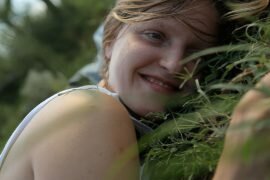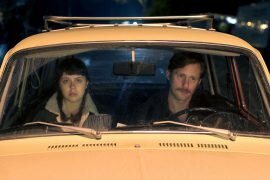It really feels like a long time since a truly great film has been made or is set in the greatest capital on the continent. We’ve all seen and love Run Lola Run (1998) and Good Bye Lenin! (2003), but we haven’t really had any films of this kind of calibre or quality since (insert heated debate about contemporary German cinema here). But this year, the Berlinale have treated us to a real Berlin-based gem in its Competition section: Victoria. This 2hr 20min film was shot, remarkably, in just one take across numerous locations in Berlin. Featuring an incredible cast of emerging German talent and a break-out, Oscar-worthy performance by the hugely impressive Barcelona actress Laia Costa, Victoria is the German genre film we’ve all been waiting for; a film that finally does the city of Berlin justice with its fast, heart-pounding pace, mesmerising camera work and epic, climactic denouement.
We met actor-turned-director Sebastian Schipper to find out just how he managed to pull-off the breathless “one take” for his first feature film.

When I heard that your film was shot in one take, I have to admit I was a little sceptical. At nearly two and a half hours long, and with quite an elaborate plot across multiple locations in Berlin, how was this physically and technically possible?
I 100% understand people questioning that and it really shows the extent that they know the process of filmmaking, as it’s actually absolutely moronic to do this. You know, everybody talks about authenticity and being radical and being direct, and all these things. The idea was to take this really literally and find out where does this really lead to, to find out if this is what people really want, is this what we want? What’s the real meaning of those words? So for us this was really part of the concept to say that we shoot the film in 3 x 1 takes, and if we have to cut then we would just say, “This film has 5 cuts”, or “3 cuts”; you know, we would say that and then we wouldn’t hide it. It would still be an amazing and crazy, close to catastrophe project, because in the end it’s really about the process, and what this process provokes. In terms of the production, of course, the organisation was huge, but everyone had their cues and we had a lot of second ADs to help.

How did you develop the story?
Well, at the beginning, I spent years at my desk writing a script. I had daytime fantasies of robbing a bank, just to do something crazy and which was very different to just sitting a desk writing a script. But of course, I didn’t do it, but then I thought maybe one day I’ll write a film about a bank robbery. I also questioned why film has this impulse to make things big, like the biggest bank robbery, and then everything is huge. But then I thought that if you were a part of even the most boring, most lame bank robbery ever, it would probably still be very exciting! So in a way part of the idea was to depict just an average bank robbery, but be really close to that and really take it seriously.
With only 3 attempts at the one take, with the last attempt being the final version of the film, were you worried about mistakes happening whilst filming?
I think that when the director has the power to take all the mistakes out, sometimes you’re missing something, you know? That’s why filmmaking is so crazy, because you’re trying to create gold out of different ingredients – and of course one of those ingredients is mistakes. I don’t have the possibility to take out any mistakes, so we had to leave them in there. For example, Freddie Lau who plays Sonne takes a Becks beer out of the fridge and puts it on the piano in the shot. I think it’s really ugly and I don’t want it to be there, but there it sits. But that’s why Becks sponsored our party last night!
What aspect of the one take interested you the most?
We were able to develop the characters whilst we were in the shooting process. Victoria is an idealist – when she does something, she’s all in: she plays the piano she’s all in; she meets someone she likes, she’s all in. This is the kind of person she is. For me, this was the most interesting aspect of the one take, as we could find these virtues of the character through the improvisation of the one take, through their interactions. Their dialogues, you couldn’t write, this developed through the improvisation.
Berlin plays such an integral part in the film, do you think you could have made this film anywhere else and would you have wanted to?
That’s really hard for me to say, as I’ve been here now for a while. But yes, you’re right, it’s really a film which has to be set in Berlin, because within Europe it’s a city which is doing very well and isn’t expensive for young people, with lots of people speaking English to one another.





2 Comments